Written by James M. Dorsey
What do Moroccan arms sales to Ukraine, a transnational Russian Iranian transit corridor, and US assistance in developing a Saudi national strategy have in common?
Together with this week’s Russian-Iranian financial messaging agreement and Chinese President Xi Jinping’s December visit to Saudi Arabia, they are smaller and bigger fragments of a 21st-century world order in the making that is likely to be bi-polar and populated by multiple middle powers with significant agency and enhanced hedging capabilities.
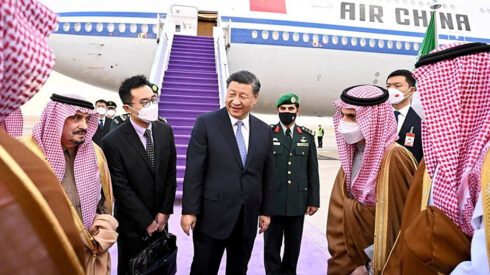
Chinese President Xi Jinping arrives in Riyadh, Saudi Arabia, on December 7, 2022. Photo: Saudi Press Agency/Reuters
So is the competition between rival US and Chinese technologies for which the jury is still out.
For the two likely dominant powers, the United States and China, the building blocks are efforts to line up their ducks in a bipolar world.
For Russia, they involve hanging on to its pre-Ukraine war status, in part by deploying its Wagner Group mercenaries to the Sahel; devising ways to circumvent sanctions; and hoping that time will work in its favour in what was supposed to be a blitzkrieg but has turned into a drawn-out slugging match.
For middle powers, the name of the game is carving out their own space, leveraging their enhanced influence, and seeking advantage where they can.
The result is that weaving the 21st century’s tapestry amounts to a patchwork in which some fragments will have long-term effects while others may not even register as a blip on the radar.
Take, for example, Morocco’s decision to give Ukraine some 20 refurbished Russian-made T-72B battle tanks. The deal made Morocco the first African, if not the first Global South nation, to militarily aid Ukraine.
The move, almost a year into the Ukraine war, is likely to have been motivated by short-term considerations, including Russia’s close ties to Morocco’s arch-rival Algeria and US recognition of Morocco’s claim to the formerly Spanish Western Sahara, rather than long-term 21st-century world order considerations.
Even so, Morocco’s breaking ranks with much of the Global South serves the US goal of sustaining the current world order in which it is the top dog, even if its power diminishes.
It doesn’t fundamentally affect China’s goal of rebalancing power in the existing order to ensure that it is bi- rather than unipolar.
The loser in the deal is Russia, which, like Iran, wants to see a new world order in which the United States is cut down to size.
The tank deal may not be a significant loss for Russia, but it does suggest that horse trading is a critical element in weaving the fabric of a new order.
So is mutual interest.
Like the arms sale, the agreement between Russia and Iran to create a financial messaging system that would allow their banks to transfer funds between one another and evade sanctions that block their access to the global SWIFT system is unlikely to have a major impact on the structure of the new world order.
Russian and Iranian efforts are potentially far more significant, centred on 3,000 kilometres of rail and sea and river shipping to link Europe with the Indian Ocean.
The transport corridor would help reshape trade and supply networks in a world that seems set to divvy up into rival blocs. Moreover, it could shield Russia and Iran from US and European sanctions as they forge closer economic ties with fast-growing economies in Asia.
Russia and Iran are not just looking at India, which sits at one extreme of the corridor.
They also expect to capitalise on their links to China. All three are members of the Shanghai Cooperation Organisation (SCO), and China and Iran are close to becoming members of the Russia-dominated Eurasian Economic Union (EEU) free trade zone.
Of a similar potential impact on a future world order is US assistance in Saudi Arabia’s development of a first-time-ever long-term vision for the kingdom’s national security, an essential building block in Crown Prince Mohammed bin Salman’s effort to modernize his military.
Saudi Arabia expects to disclose its strategy later this year. It would codify “the kingdom’s strategic vision for national security and regional security,” according to Gen. Michael “Erik” Kurilla, the top commander of US forces in the Middle East, who is advising his Saudi counterparts.
Shaping Saudi strategy as well as military modernization may be the United States’ best bet to imbue at least some of its values and complicate the establishment of similar defense ties with China or Russia. Moreover, it would enhance the kingdom’s ability to absorb and utilize US weapons systems.
“The Saudis, under MBS’s (Mohammed bin Salman’s) leadership, now recognize (their) deficiencies and seem, for the first time, determined to address them in partnership with the United States and to a degree with the United Kingdom,” said political-military analyst and former Pentagon official Bilal Y. Saab.
That will undoubtedly register on the geopolitical chessboard, even if small moves also count for something.
Dr. James M. Dorsey is an award-winning journalist and scholar, a Senior Fellow at the National University of Singapore’s Middle East Institute and Adjunct Senior Fellow at Nanyang Technological University’s S. Rajaratnam School of International Studies, and the author of the syndicated column and blog, The Turbulent World of Middle East Soccer.



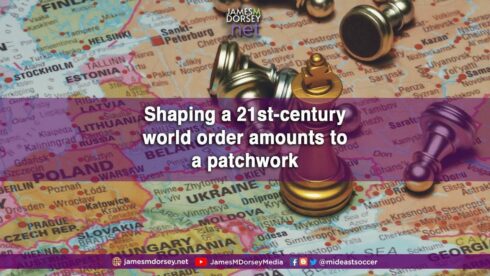
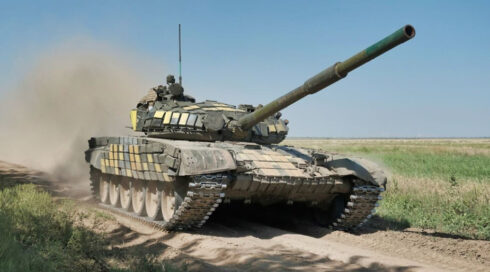
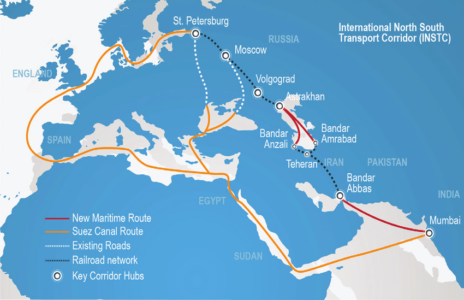
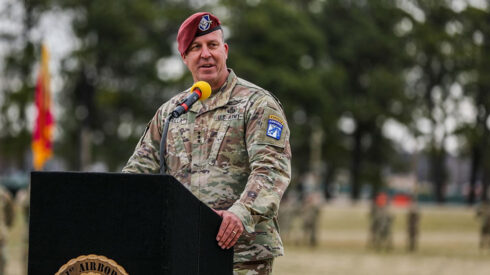



The masters of America believed they were dictating the laws to the whole world……………. but unfortunately for them, by now they no longer captivate anyone…….. ………….. the advantages of being friends or allies with the Americans are tremendous disadvantages for the country that is duped. So the Trend these days is distancing from America and approaching the Triad (Russia, China, Iran).
They are three serious nations, with sane and honest elites. They conquer hearts and minds. Even if the Americans do it for your own good (ha ha ha ha ha!), nobody likes bombs.
America’s rough masters have burned themselves. Best wishes for an end painful.
Iran is more libtard than America. Iran is dictating nothing. They are only spewing propaganda and empty threats, and empty claims, while busy being the World’s capital of transgender operations.
This multipolar world will bear fruit worldwide. Increased trade and commerce serve the ends of peace and prosperity.
Russia suicidally jumped off a cliff when it invaded Ukraine and now pays huge cost in blood and treasure and isolation. A far better course would have been to continue to penetrate Europe via economic interaction. Some sort of exit path is needed. I have been lobbying for this for months, since last spring, but Kremlin politics and Putin’s pride seem to stand in the way.
Get your hand off it fkhed,deadset you treat mature adults like 4 year olds,needs a smack in the mouth
YA WEAK DEPLORABLE FILTHY SLIMES GOING DOWN,BESIDES YOU DEALS ARE ALL SHT ANYWAY!
=Z=
Dorsey grow up,before russia obliterates yesteryears hegemon beyond recall,to your damnation,the future is clear russia is the most formidable miliraty and fossil power on earth (period)usa is doomed!
This Dorsey is sure that US is the major power but together with other Nato countries controlled by the same globalist elite with it’s antifamily ,pedophile, lgbt, euthanasia,etc. “values” believed by a minority of the world population it has no future.
You can even have the best miltary but without a united society you are doomed to fail
YOU CANT FOOL THE COMPETENT ENGINEER,DO THE MATH WEAKLINGS,1.5 MILLION PRO TRAINED BETTER EDUCATED MILITA WILL RULE THE FUTURE,FORGET ABOUT YOUR QUAD VAXXED LGBTQISM!
Tanks don’t matter anymore. Ukraine conflict is in stalemate and with every single day only worsens. I doubt the problem could be solved diplomatically as West is systematically challenging all Russian redlines and Russia finally understands that this is a war to survive and this means WW3 scenario.
Even Putin stopped to use his “Western partners” and “Specoperacja” mantra.
The only solution seems to be military one as West don’t want any reasonable agreement and pushes forward, it must end with nukes – sooner or later.